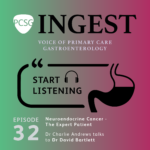Neuroendocrine Cancer – The Expert Patient

/
RSS Feed
The episode features Dr. David Bartlett, a retired GP and neuroendocrine cancer patient, offering a dual perspective as both clinician and patient.
Key Learnings from this episode.
Patient Experience and Diagnostic Challenges
- Dr. Bartlett’s symptoms began with severe, intermittent abdominal pain, starting in 2001, but he did not seek medical help for several years due to a combination of stoicism, not wanting to trouble others, and a belief in the commonality of benign causes.
- Over 15 years, he experienced repeated misdiagnoses, primarily being labeled as having irritable bowel syndrome (IBS) despite atypical features (severe pain, minimal bowel habit change, and no systemic symptoms).
- Multiple opinions and investigations (including ultrasounds and CT scans) failed to identify the underlying cause, with a key scan being misread by local radiologists.
- The correct diagnosis of a small bowel neuroendocrine tumour was only made after a tertiary centre re-examined previous scans, highlighting the importance of specialist review and persistence in unexplained cases.
Clinical Red Flags and Symptomatology
- Dr. Bartlett’s case underscores that neuroendocrine tumors can present with isolated, severe abdominal pain without classic red flags (vomiting, weight loss, significant bowel changes)[1].
- He retrospectively identified subtle signs of carcinoid syndrome (flushing, one episode of profound diarrhoea, and skin changes), which are present in only about 10% of small bowel neuroendocrine tumour cases.
- The lack of awareness about neuroendocrine tumors, even among experienced clinicians, contributed to the diagnostic delay[1].
Lessons for Primary Care and Clinicians
- The story illustrates the risk of anchoring on common diagnoses (like IBS) and the need to reconsider the diagnosis when symptoms are severe, persistent, or atypical.
- It highlights the value of listening to the patient’s narrative, especially when symptoms do not fit classic patterns, and the importance of considering rare conditions in the differential diagnosis.
- The episode emphasises the need for ongoing education about neuroendocrine tumours and the importance of keeping rare but serious conditions on the diagnostic radar in primary care.
Management Insights
- Standard treatment for small bowel neuroendocrine tumours often includes monthly somatostatin analog injections (e.g., lanreotide).
- Surgical intervention may be considered, but it carries specific risks such as carcinoid crisis, requiring specialised perioperative management.
- The decision for surgery is individualised, weighing potential symptomatic improvement against procedural risks.
Systemic and Human Factors
- Dr. Bartlett’s experience reflects how personal traits (stoicism, reluctance to seek help) and systemic issues (misinterpretation of scans, diagnostic inertia) can delay diagnosis.
- The narrative also demonstrates the importance of patient advocacy, persistence, and the value of second (or third) opinions, especially in complex or unresolved cases.
Educational Value
- The episode serves as a reminder for clinicians to maintain a broad differential, revisit diagnoses when the clinical picture changes, and to be aware of their own cognitive biases.
- It also advocates for the inclusion of patient voices in medical education to better understand the lived experience and challenges of rare diseases like neuroendocrine cancer.
Summary Table: Key Learnings
| Theme | Key Points |
|---|---|
| Diagnostic Delay | 15 years from symptom onset to diagnosis; misdiagnosed as IBS despite atypical features |
| Symptomatology | Severe, intermittent abdominal pain; minimal bowel changes; subtle carcinoid syndrome |
| Clinical Lessons | Importance of specialist review, reconsidering diagnoses, and listening to patient stories |
| Management | Use of somatostatin analogs; surgery considered but with specific risks |
| Systemic Factors | Impact of stoicism, misread scans, and diagnostic inertia |
| Educational Takeaway | Need for awareness of rare conditions and patient-centered education |
These insights from the transcript highlight the complexities of diagnosing and managing neuroendocrine cancer, especially in primary care, and the critical role of patient experience in improving clinical practice.
